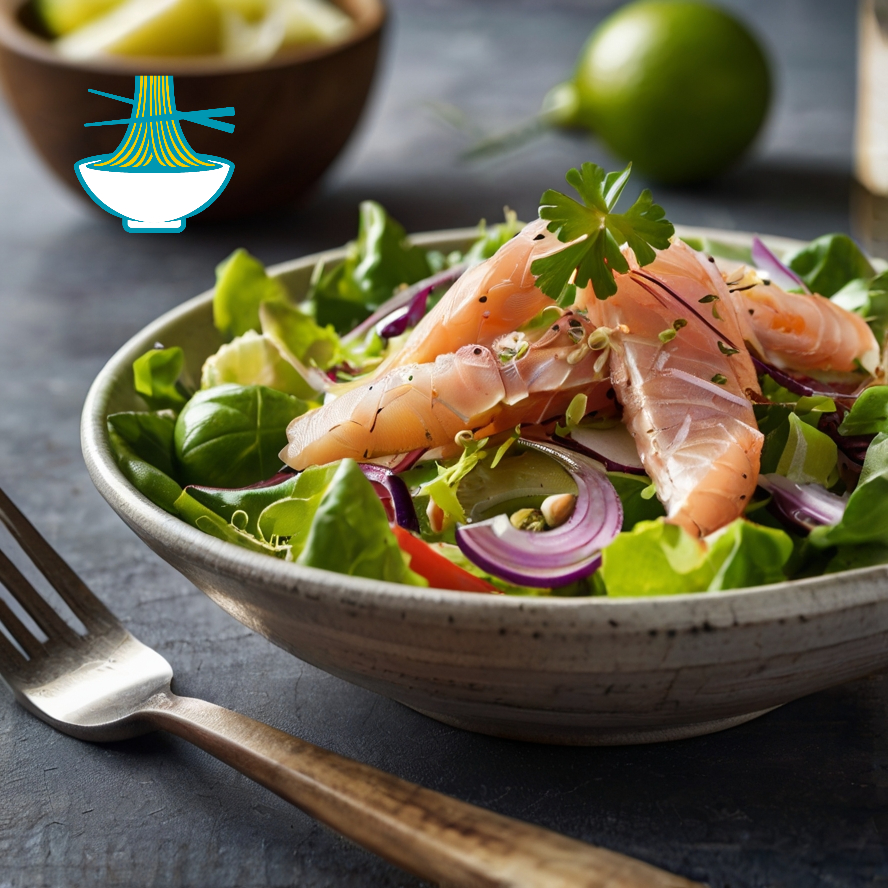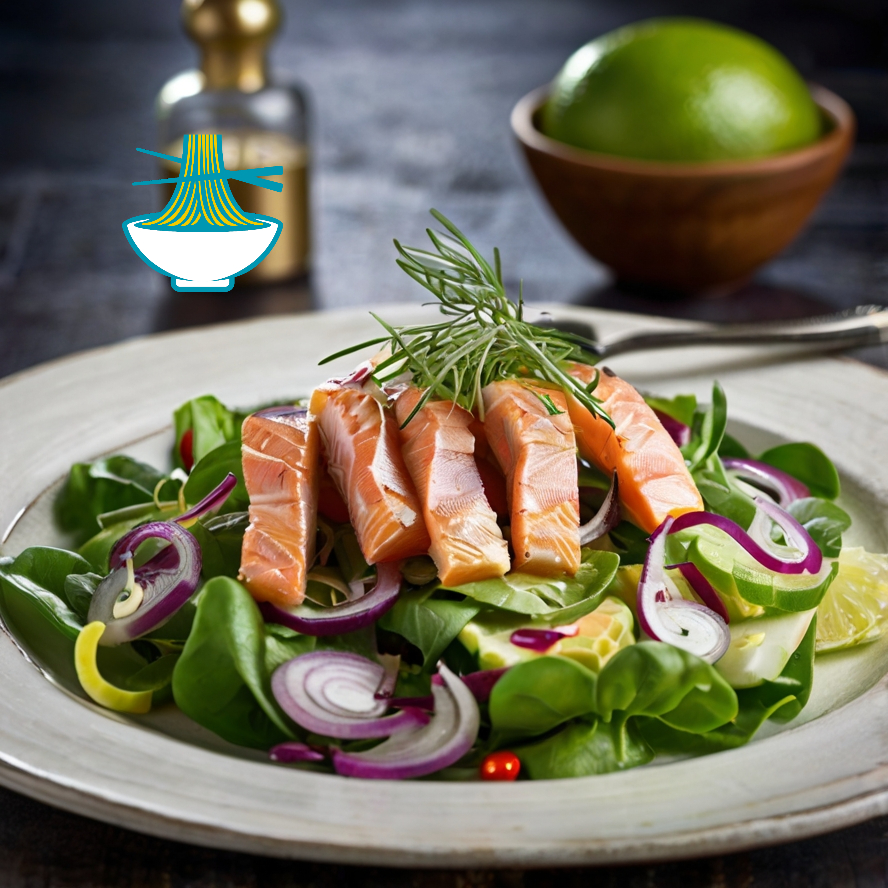Discover the perfect blend of flavors with this Smoked Fish Salad recipe. Featuring tender smoked fish, crisp onions, and a zesty lime dressing, this salad is a refreshing and nutritious choice for any meal. Easy to prepare and packed with taste, it’s a must-try for seafood lovers!
Ingredients:
- 200g smoked fish (such as mackerel or trout), flaked
- 1 medium red onion, finely sliced
- 1 bell pepper (red or yellow), diced
- 1 cucumber, diced
- 2 cups mixed salad greens (lettuce, arugula, spinach)
- 2 tablespoons fresh dill or parsley, chopped (optional)
For the Lime Dressing:
- 3 tablespoons fresh lime juice
- 2 tablespoons olive oil
- 1 tablespoon honey or agave syrup
- 1 teaspoon Dijon mustard
- Salt and pepper to taste
Instructions:
Prepare the Salad Ingredients:
- In a large bowl, combine the flaked smoked fish, sliced red onion, diced bell pepper, and cucumber.
- Gently toss the ingredients to mix them evenly.
Make the Lime Dressing:
- In a small bowl or jar, whisk together the lime juice, olive oil, honey, Dijon mustard, salt, and pepper until well combined.
Assemble the Salad:
- Add the mixed salad greens to the bowl with the fish and vegetables.
- Drizzle the lime dressing over the salad.
- Toss gently to coat all the ingredients with the dressing.
Serve:
- Garnish with fresh dill or parsley if desired.
- Serve immediately or chill in the refrigerator for a refreshing cold salad.
Enjoy this vibrant and flavorful Smoked Fish Salad as a light lunch or a satisfying dinner!
Nutritional values
200g smoked fish (such as mackerel or trout), flaked:
- Approximately:
- 300 calories
- 40g protein
- 0g carbohydrates
- 15g fat
Benefits: Rich in protein and omega-3 fatty acids, which support heart health, reduce inflammation, and enhance brain function. Also provides vitamins and minerals like B12, D, and selenium.
1 medium red onion, finely sliced:
- Approximately:
- 45 calories
- 1g protein
- 11g carbohydrates
- 0g fat
Benefits: Contains antioxidants and sulfur compounds that can support heart health, improve digestion, and have anti-inflammatory effects.
1 bell pepper (red or yellow), diced:
- Approximately:
- 30 calories
- 1g protein
- 7g carbohydrates
- 0g fat
Benefits: High in vitamins A and C, which support immune function, skin health, and eye health. Also provides antioxidants and fiber.
1 cucumber, diced:
- Approximately:
- 16 calories
- 0.7g protein
- 4g carbohydrates
- 0g fat
Benefits: Provides hydration, vitamins (such as vitamin K), and antioxidants. Cucumber can also aid in digestion and support skin health.
2 cups mixed salad greens (lettuce, arugula, spinach):
- Approximately:
- 20 calories
- 2g protein
- 3g carbohydrates
- 0g fat
Benefits: Rich in vitamins A, C, K, and folate, as well as minerals like iron and calcium. Salad greens provide antioxidants and fiber, supporting overall health and digestion.
2 tablespoons fresh dill or parsley, chopped (optional):
- Approximately:
- 4 calories
- 0.2g protein
- 1g carbohydrates
- 0g fat
Benefits: Dill and parsley are rich in vitamins A and C, and have antioxidant properties. They can aid digestion and provide a fresh flavor to dishes.
For the Lime Dressing:
3 tablespoons fresh lime juice:
- Approximately:
- 10 calories
- 0g protein
- 3g carbohydrates
- 0g fat
Benefits: Provides vitamin C, which supports immune function and skin health. Lime juice also has antioxidant properties.
2 tablespoons olive oil:
- Approximately:
- 240 calories
- 0g protein
- 0g carbohydrates
- 28g fat
Benefits: Contains monounsaturated fats and antioxidants that support heart health, reduce inflammation, and aid in digestion.
1 tablespoon honey or agave syrup:
- Approximately:
- 64 calories
- 0.1g protein
- 17g carbohydrates
- 0g fat
Benefits: Provides natural sweetness and energy. Honey has antibacterial properties, while agave syrup is a lower glycemic alternative to sugar.
1 teaspoon Dijon mustard:
- Approximately:
- 5 calories
- 0.3g protein
- 0.5g carbohydrates
- 0.3g fat
Benefits: Contains antioxidants and can aid in digestion. Dijon mustard adds flavor with minimal calories.
Salt and pepper to taste:
Salt:
- Approximately:
- 0 calories
- 0g protein
- 0g carbohydrates
- 0g fat
Benefits: Enhances flavor but should be used in moderation to avoid high sodium intake.
Pepper:
- Approximately:
- 6 calories (per teaspoon)
- 0.2g protein
- 1g carbohydrates
- 0.1g fat
Benefits: Contains antioxidants and may aid digestion and improve metabolism.


Comments